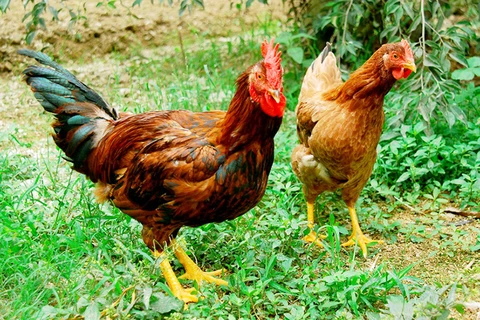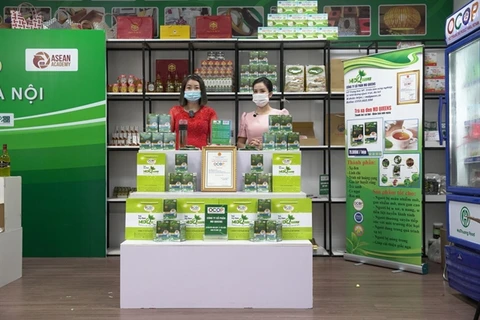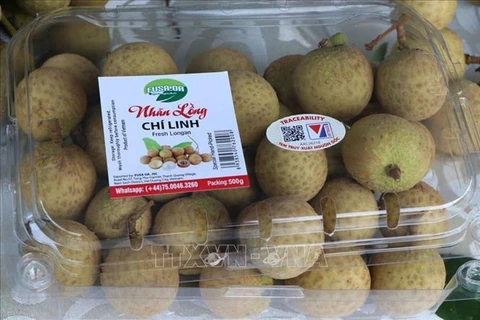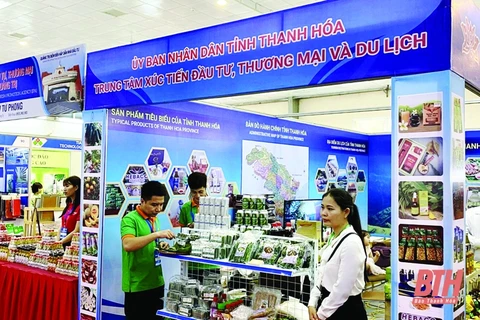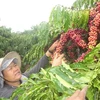Hanoi (VNA) - A website featuring One Commune, One Product (OCOP) products of Hanoi has been launched, announced the city’s Coordination Office for New-style Rural Area Building on August 12.
The site https://nongthonmoihanoi.gov.vn/ aims to further promote the city's OCOP programme to domestic and foreign consumers.
After two years of assessment and classification, Hanoi has a total of 1,054 products receiving at least three-star ratings produced by 74 firms, 82 cooperatives, and 99 household businesses which create jobs for over 5,000 rural workers.
Four-star products account for a lion’s share of 69.36 percent with 731, while 306 are rated three stars.
The majority of the OCOP products (65.56 percent) are foods while souvenirs, furniture and décor products account for 28.37 percent of the total. The remainders are beverages, herbal medicine, fabrics and apparel.
Products that have received recognition will be reviewed regularly.
The first-ever livestream promoting products of Hanoi’s OCOP programme was held early June by the Hanoi Coordination Office for New-style Rural Area Building together with the ASEAN Digital Conversion Research Institute (ASEAN Academy).
This event aimed to support stakeholders in the production, sale and marketing of OCOP products through digital technologies and e-commerce platforms, especially against the backdrop of COVID-19.
The Hanoi Department of Industry and Trade will organise five Vietnamese Goods Weeks in Hanoi this year to stimulate domestic demand and increase total retail sales, thereby helping businesses and farmers consume products.
Specifically, the five weeks will have a scale of about 100 standard booths each week.
Notably, Hanoi will support 50 percent of booth costs for participating units with a maximum of two booths per unit; similar support will be provided to each locality. In which, the city will pay attention to support localities and businesses of Hanoi and other localities in consuming agricultural products, aquatic products, and fruit, which face difficulties in consumption due to the impact of the COVID-19 pandemic.
At the same time, it will also strengthen communication and promotion, create the best conditions for businesses to reach consumers and expand the market.
In 2020, 14 OCOP showrooms were put into operation in the capital city.
Hanoi targets building new-style rural areas in all districts and communes, 40 percent of enhanced-criteria rural communes, and 20 percent of model rural communes, while turning five suburban districts into urban districts.
The OCOP was initiated by the Ministry of Agriculture and Rural Development in 2008, based on Japan’s “One Village, One Product” and Thailand’s “One Town, One Product” programmes. It is an economic development programme for rural areas and focuses on increasing internal power and values, and is also to help with the national target programme on new-style rural area building.
Hanoi’s six districts have been recognised as new-style rural areas by the Prime Minister, together with 355 communes, or 92.9 percent of the total, and 13 others that meet enhanced criteria for new-style rural area development.
Vietnam verified, rated, and recognised a total of 3,200 products as OCOP goods last year, 800 higher than planned, according to the Ministry of Agriculture and Rural Development.
The national OCOP council is reviewing 43 products for five-star ratings, the ministry said.
OCOP products are made from a combination of local resources, traditional culture, and advanced technology, which facilitates the development of diverse products with better quality and packaging, and the ability to trace product origin.
The programme has provided farmers with the chance to come together to form cooperatives, which now account for 38 percent of 1,400 OCOP producers nationwide. The establishment of these cooperatives has allowed farmers to create products with better quality, design, and packaging as well as higher standards, and made products more relevant to market demand./.
The site https://nongthonmoihanoi.gov.vn/ aims to further promote the city's OCOP programme to domestic and foreign consumers.
After two years of assessment and classification, Hanoi has a total of 1,054 products receiving at least three-star ratings produced by 74 firms, 82 cooperatives, and 99 household businesses which create jobs for over 5,000 rural workers.
Four-star products account for a lion’s share of 69.36 percent with 731, while 306 are rated three stars.
The majority of the OCOP products (65.56 percent) are foods while souvenirs, furniture and décor products account for 28.37 percent of the total. The remainders are beverages, herbal medicine, fabrics and apparel.
Products that have received recognition will be reviewed regularly.
The first-ever livestream promoting products of Hanoi’s OCOP programme was held early June by the Hanoi Coordination Office for New-style Rural Area Building together with the ASEAN Digital Conversion Research Institute (ASEAN Academy).
This event aimed to support stakeholders in the production, sale and marketing of OCOP products through digital technologies and e-commerce platforms, especially against the backdrop of COVID-19.
The Hanoi Department of Industry and Trade will organise five Vietnamese Goods Weeks in Hanoi this year to stimulate domestic demand and increase total retail sales, thereby helping businesses and farmers consume products.
Specifically, the five weeks will have a scale of about 100 standard booths each week.
Notably, Hanoi will support 50 percent of booth costs for participating units with a maximum of two booths per unit; similar support will be provided to each locality. In which, the city will pay attention to support localities and businesses of Hanoi and other localities in consuming agricultural products, aquatic products, and fruit, which face difficulties in consumption due to the impact of the COVID-19 pandemic.
At the same time, it will also strengthen communication and promotion, create the best conditions for businesses to reach consumers and expand the market.
In 2020, 14 OCOP showrooms were put into operation in the capital city.
Hanoi targets building new-style rural areas in all districts and communes, 40 percent of enhanced-criteria rural communes, and 20 percent of model rural communes, while turning five suburban districts into urban districts.
The OCOP was initiated by the Ministry of Agriculture and Rural Development in 2008, based on Japan’s “One Village, One Product” and Thailand’s “One Town, One Product” programmes. It is an economic development programme for rural areas and focuses on increasing internal power and values, and is also to help with the national target programme on new-style rural area building.
Hanoi’s six districts have been recognised as new-style rural areas by the Prime Minister, together with 355 communes, or 92.9 percent of the total, and 13 others that meet enhanced criteria for new-style rural area development.
Vietnam verified, rated, and recognised a total of 3,200 products as OCOP goods last year, 800 higher than planned, according to the Ministry of Agriculture and Rural Development.
The national OCOP council is reviewing 43 products for five-star ratings, the ministry said.
OCOP products are made from a combination of local resources, traditional culture, and advanced technology, which facilitates the development of diverse products with better quality and packaging, and the ability to trace product origin.
The programme has provided farmers with the chance to come together to form cooperatives, which now account for 38 percent of 1,400 OCOP producers nationwide. The establishment of these cooperatives has allowed farmers to create products with better quality, design, and packaging as well as higher standards, and made products more relevant to market demand./.
VNA

